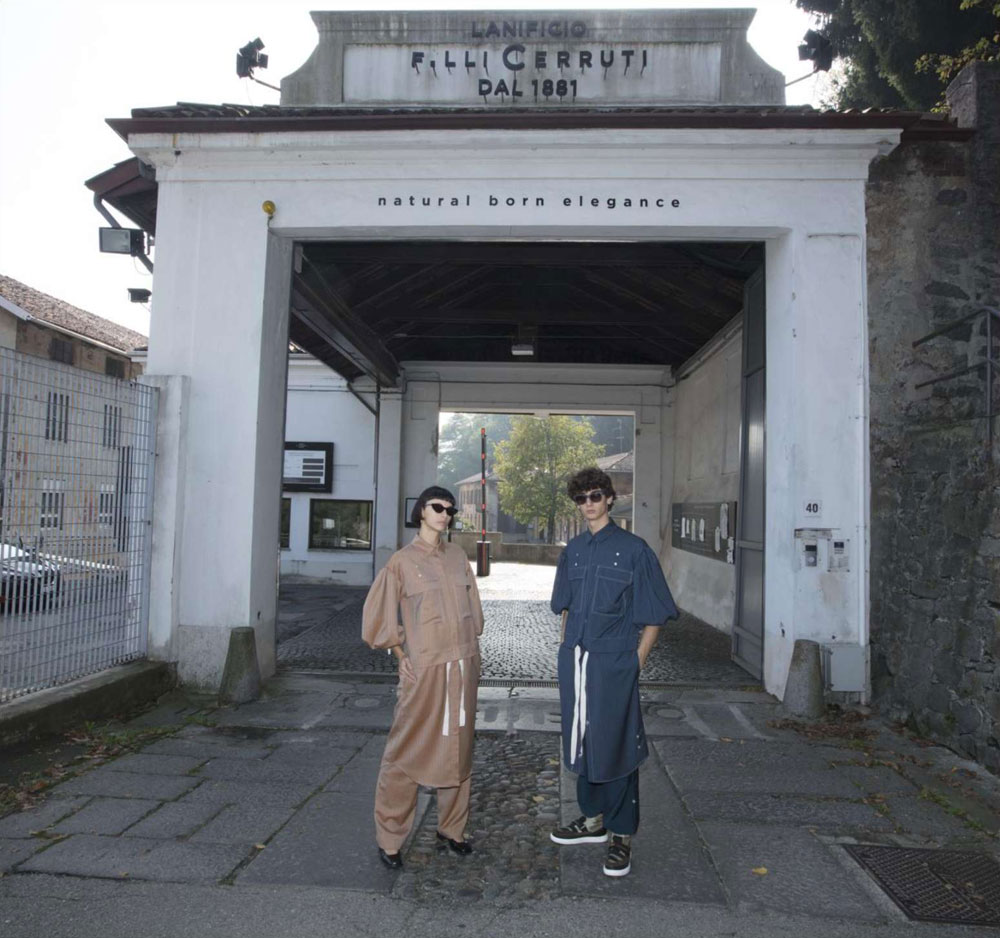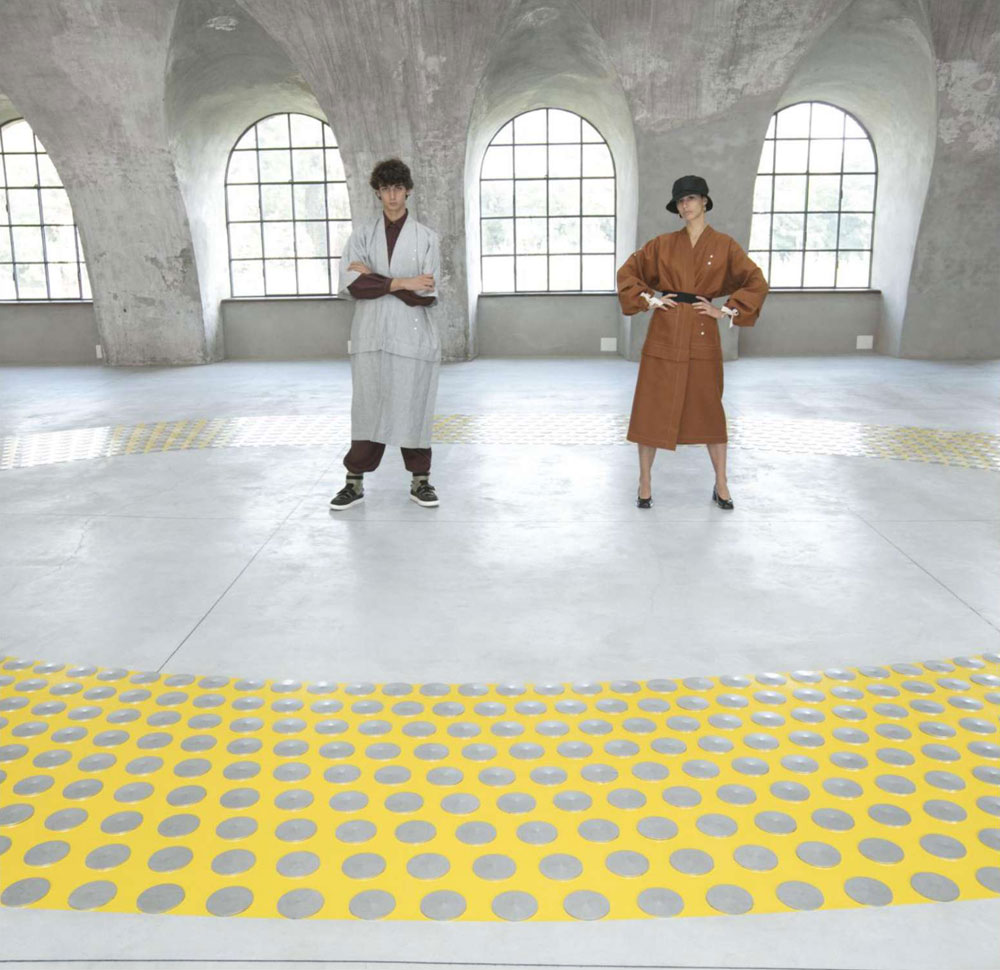From the flask to the pouring, to the glass: how wine consumption evolved according to the Marketing Director of the largest wine-making cooperative in Italy.
In 2019 Flavia La Rocca won the Franca Sozzani GCFA Award for Best Emerging Designer at the Green Carpet Awards with her modular dress that can take on different forms and styles. What pieces better than one like this can create a never-ending wardrobe?
To Flavia, fashion means a virtuous balance between beauty and ethics, and it is for this reason that she adds the idea of responsible, circular, low-impact fashion to her modular creations, all featuring natural and regenerated fabrics.
What do you mean by modularity in the fashion world?
FLR - The collection has no standard pieces but rather interchangeable modules that you can attach with hidden zippers. This means your wardrobe is ever-changing and never-ending.
Also, the modules go past the idea of seasonality and can be reinvented by the wearer; another important thing is that all the ones of the same size fit together, regardless of the collection they belong to.
Season after season, I simply add variables that can increase multi-functionality and customization.
Sustainability and eco-friendliness are words that have by now been torn to shreds. What do they mean to you?
FLR - It’s a lifestyle, and a responsibility. My project is environmentally conscious from start to finish, from the idea to the production phase: I follow each and every step along the chain, from the suppliers to those who create the clothes, from packaging to shipping. Because to me, being sustainable means pushing for change, replacing the idea of “single use” items.
Sustainable materials and techniques like Tencel, the Recycrom dye by Officina+39, N-Denim by Candiani Denim… How were you able to put all these elements together?
FLR - By researching - continuously. Also, what helped me in the last two years was working with Cittadellarte - Fondazione Pistoletto in Biella where I and other nine designers founded the B.E.S.T. Fashion collective with important pieces of the chain at different levels, from fibre to fabric producers, to manufacturers. All people that have come together to improve environmental awareness. It is through them that I had the chance to meet and work with the companies you mentioned. Tencel - and more specifically Tencel™ Luxe - is the eco-friendly version of silk, super soft on the skin, biodegradable, a single thread of cellulose obtained from sustainable forests. Recycrom is, instead, a revolutionary line of dyes that you get from recycled dye powder taken from used clothing and fabric scraps. Last but not least, Candiani’s denim is 100% GOTS (Global Organic Textile Standard) certified organic cotton, dyed using the N-Denim technology which saves on water and chemical products.


You use Cooperativa Emmaus for your creations: is that for economic reasons?
FLR - No, it’s a purely ethical choice, and something I’ve always wanted to add to my project. For them, work is a way to help people that have fallen on hard times get back into society. Also, they have strict criteria on sustainability, both in regards to the environment and to the production process, and are a great example of the balance we need between quality and solidarity. And I make sure to pay fairly as the goal is not to save money but to properly consider everyone’s work.
Tell me more about your 2020-2021 Autumn/Winter collection, a blend of ethics and aesthetics.
FLR - Let’s say that it is a reflection of my evolution, both personal and professional. What I did was focus on timeless pieces and beautiful fabrics. For coats and outerwear I used regenerated carded textiles by Manteco, the main world producer of premium wool. Manteco was the one that started MWool, the latest prototype of converted wool that supplies the Global Recycled Standard of Textile Exchange, the certification body that guarantees newly-transformed products, and social, environmental, and chemical responsibility processes.
I designed fluid modules in pastels for clothing that has no gender, blouses, and sleep dresses; coats for both men and women in earthy colours to match with pant or skirt modules to create tone-on-tone outfits. Denim, on the other hand, I used to create unusual suits and corset dresses, and I added adjustable scoops on the sides of the skirts. Last but not least, the removable panels add and remove volume as do the accessories - modular and transformable as well - made from the cork left over from old production processes.
The 2019 Green Carpet Fashion Awards: Tell me more about the dress that made you win.
FLR - The jury of the CNMI Green Carpet Talent Competition awarded the prize to a “chameleon dress”, the highest peak of my foray into modularity. This is made out of three modules, four frills, and a bow, all removable and double-sided. Basically, it’s a piece you can wear in over 40 different ways. I’ve put the greatest care in the details as well: for example, the corset is lined with cork (a scrap from past collections) to as to allow it to keep shape but without using plastic or adhesive. Even the Phillacolor dye is 100% natural.
Little Black Dress and Kickstarter: when and how will this relationship start?
FLR - The idea was to make my must-have, the little black dress, available for preorder on Kickstarter. The Little Modular Black Dress comes in a small bag and consists of 3 modules plus 2 straps that create 11 different pieces (4 tops, 2 skirts, 5 dresses) to wear in 10 different combinations. I’ve chosen this because it is what all women need to have in their wardrobe - but in this case, it can also turn into a mini and midi skirt, round-neck shirt, crop top, midi and mini dress that can be round-neck, with or without straps. And for it I used a “no season” fabric, created together with the Lanificio Fratelli Cerruti 1881: a mix of Tencel Luxe and virgin wool with a weave that recalls that of a tree. What better way than that to reconnect with nature?
From the flask to the pouring, to the glass: how wine consumption evolved according to the Marketing Director of the largest wine-making cooperative in Italy.
From the stage to real life: how to bring improvisation and respect for ourselves and others to the forefront... bringing out everybody’s value.
